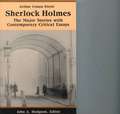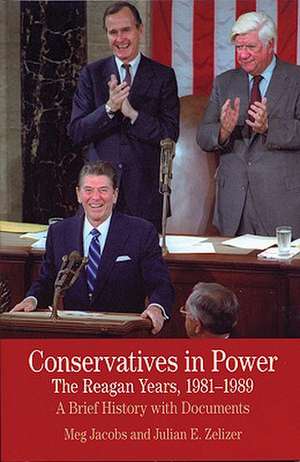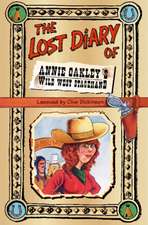Conservatives in Power: A Brief History with Documents: Bedford Series in History & Culture (Paperback)
Autor Meg Jacobs, Julian E. Zelizeren Limba Engleză Paperback – 31 aug 2010
Din seria Bedford Series in History & Culture (Paperback)
-
 Preț: 219.00 lei
Preț: 219.00 lei - 31%
 Preț: 246.18 lei
Preț: 246.18 lei - 32%
 Preț: 219.20 lei
Preț: 219.20 lei -
 Preț: 216.80 lei
Preț: 216.80 lei - 32%
 Preț: 235.03 lei
Preț: 235.03 lei - 32%
 Preț: 223.79 lei
Preț: 223.79 lei - 33%
 Preț: 228.05 lei
Preț: 228.05 lei - 33%
 Preț: 216.80 lei
Preț: 216.80 lei - 33%
 Preț: 216.80 lei
Preț: 216.80 lei - 33%
 Preț: 222.88 lei
Preț: 222.88 lei - 33%
 Preț: 216.25 lei
Preț: 216.25 lei - 32%
 Preț: 235.03 lei
Preț: 235.03 lei -
 Preț: 222.68 lei
Preț: 222.68 lei -
 Preț: 211.35 lei
Preț: 211.35 lei -
 Preț: 137.47 lei
Preț: 137.47 lei -
 Preț: 207.89 lei
Preț: 207.89 lei -
 Preț: 207.89 lei
Preț: 207.89 lei -
 Preț: 209.62 lei
Preț: 209.62 lei -
 Preț: 207.71 lei
Preț: 207.71 lei - 32%
 Preț: 235.03 lei
Preț: 235.03 lei - 33%
 Preț: 217.46 lei
Preț: 217.46 lei - 31%
 Preț: 160.87 lei
Preț: 160.87 lei - 33%
 Preț: 223.36 lei
Preț: 223.36 lei -
 Preț: 198.58 lei
Preț: 198.58 lei
Preț: 223.79 lei
Preț vechi: 331.39 lei
-32% Nou
Puncte Express: 336
Preț estimativ în valută:
42.84€ • 46.54$ • 36.01£
42.84€ • 46.54$ • 36.01£
Carte disponibilă
Livrare economică 31 martie-14 aprilie
Preluare comenzi: 021 569.72.76
Specificații
ISBN-13: 9780312488314
ISBN-10: 0312488319
Pagini: 258
Dimensiuni: 137 x 206 x 10 mm
Greutate: 0.25 kg
Editura: BEDFORD BOOKS
Seria Bedford Series in History & Culture (Paperback)
Locul publicării:New York, United States
ISBN-10: 0312488319
Pagini: 258
Dimensiuni: 137 x 206 x 10 mm
Greutate: 0.25 kg
Editura: BEDFORD BOOKS
Seria Bedford Series in History & Culture (Paperback)
Locul publicării:New York, United States
Cuprins
Foreword
Preface
Preface
PART ONE. Introduction: Mr. Conservative Comes to Washington
From Movement to Governance
Domestic Politics
National Security
Conservatism since 1988
From Movement to Governance
Domestic Politics
National Security
Conservatism since 1988
PART TWO. The Documents
Origins, 1957-1980
1. Ronald Reagan, Commencement Address at Eureka College, June 7, 1957
2. Ronald Reagan, A Time for Choosing, October 27, 1964
3. Ronald Reagan, Campaign Speech at the Cow Palace, San Francisco, May 12, 1966
4. Ronald Reagan, California and the Problem of Government Growth, January 5, 1967
5. Ronald Reagan, Speech to America, March 31, 1976
6. Newt Gingrich, Campaign Speech to College Republicans in Atlanta, June 24, 1978
7. Ronald Reagan, Speech at Neshoba County Fair, August 3, 1980
Reaganomics, 1981
8. Ronald Reagan, Inaugural Address, January 20, 1981
9. Ronald Reagan, Address to the Nation on the Economy, February 5, 1981
10. Robert Michel, Letter to Republican Colleagues, May 29, 1981
11. Ronald Reagan, Air Traffic Controllers Strike, August 3, 1981
12. William Greider, The Education of David Stockman, December 1981
Mobilizing on the Political Left and Right, 1982
13. Elizabeth H. Dole, Black Strategy, February 24, 1982
14. William F. Sittmann, Summer Alternatives, May 5, 1982
15. Elizabeth H. Dole, Conservative Social Agenda, March 9, 1982
16. John T. (Terry) Dolan, Letter to James Baker, August 12, 1982
17. Ronald Reagan, Letter to Barry Goldwater, September 7, 1982
18. Lee Atwater, “The Gender Gap”: A Postelection Assessment, November 23, 1982
Morning in America: Reagan's Reelection, 1983-1985
19. Thomas P. O'Neill Jr., Campaign to Save Medicare/Medicaid, 1984
20. Ronald Reagan, Radio Address to the Nation on the Presidential Campaign, October 13, 1984
21. Ronald Reagan, Remarks of the President to the Twelfth Annual Conservative Political Action Conference, March 1, 1985
Domestic Culture Wars, 1986-1988
22. William J. Bennett, Completing the Reagan Revolution, July 8, 1986
23. Ronald Reagan, Address to the Nation on the Campaign against Drug Abuse, September 14, 1986
24. Edward M. Kennedy, Robert Bork's America, July 1, 1987
25. Gary L. Bauer, Issues Update - Taxes and the Budget, October 23, 1987
26. Frank J. Donatelli, “Selfishness” as a 1988 Campaign Issue, January 6, 1988
27. Ronald Reagan, 1988 Legislative and Administrative Message: A Union of Individuals, January 25, 1988
Reagan's Foreign Policy: Peace through Strength, 1980-1983
28. Ronald Reagan, A Strategy for Peace in the Eighties, October 19, 1980
29. Alexander M. Haig Jr., Letter to Brezhnev, September 18, 1981
30. Minutes of National Security Council Meeting on Strategy toward Cuba and Central America, November 10, 1981
31. A Public Affairs Program to Support the Administration's Nuclear Policy, May 5, 1982
32. National Security Council, Directive No. 75 on U.S. Relations with the USSR, January 17, 1983
33. Ronald Reagan, “Evil Empire” Speech, March 8, 1983
34. Ronald Reagan, Address to the Nation on Defense and National Security, March 23, 1983
Origins, 1957-1980
1. Ronald Reagan, Commencement Address at Eureka College, June 7, 1957
2. Ronald Reagan, A Time for Choosing, October 27, 1964
3. Ronald Reagan, Campaign Speech at the Cow Palace, San Francisco, May 12, 1966
4. Ronald Reagan, California and the Problem of Government Growth, January 5, 1967
5. Ronald Reagan, Speech to America, March 31, 1976
6. Newt Gingrich, Campaign Speech to College Republicans in Atlanta, June 24, 1978
7. Ronald Reagan, Speech at Neshoba County Fair, August 3, 1980
Reaganomics, 1981
8. Ronald Reagan, Inaugural Address, January 20, 1981
9. Ronald Reagan, Address to the Nation on the Economy, February 5, 1981
10. Robert Michel, Letter to Republican Colleagues, May 29, 1981
11. Ronald Reagan, Air Traffic Controllers Strike, August 3, 1981
12. William Greider, The Education of David Stockman, December 1981
Mobilizing on the Political Left and Right, 1982
13. Elizabeth H. Dole, Black Strategy, February 24, 1982
14. William F. Sittmann, Summer Alternatives, May 5, 1982
15. Elizabeth H. Dole, Conservative Social Agenda, March 9, 1982
16. John T. (Terry) Dolan, Letter to James Baker, August 12, 1982
17. Ronald Reagan, Letter to Barry Goldwater, September 7, 1982
18. Lee Atwater, “The Gender Gap”: A Postelection Assessment, November 23, 1982
Morning in America: Reagan's Reelection, 1983-1985
19. Thomas P. O'Neill Jr., Campaign to Save Medicare/Medicaid, 1984
20. Ronald Reagan, Radio Address to the Nation on the Presidential Campaign, October 13, 1984
21. Ronald Reagan, Remarks of the President to the Twelfth Annual Conservative Political Action Conference, March 1, 1985
Domestic Culture Wars, 1986-1988
22. William J. Bennett, Completing the Reagan Revolution, July 8, 1986
23. Ronald Reagan, Address to the Nation on the Campaign against Drug Abuse, September 14, 1986
24. Edward M. Kennedy, Robert Bork's America, July 1, 1987
25. Gary L. Bauer, Issues Update - Taxes and the Budget, October 23, 1987
26. Frank J. Donatelli, “Selfishness” as a 1988 Campaign Issue, January 6, 1988
27. Ronald Reagan, 1988 Legislative and Administrative Message: A Union of Individuals, January 25, 1988
Reagan's Foreign Policy: Peace through Strength, 1980-1983
28. Ronald Reagan, A Strategy for Peace in the Eighties, October 19, 1980
29. Alexander M. Haig Jr., Letter to Brezhnev, September 18, 1981
30. Minutes of National Security Council Meeting on Strategy toward Cuba and Central America, November 10, 1981
31. A Public Affairs Program to Support the Administration's Nuclear Policy, May 5, 1982
32. National Security Council, Directive No. 75 on U.S. Relations with the USSR, January 17, 1983
33. Ronald Reagan, “Evil Empire” Speech, March 8, 1983
34. Ronald Reagan, Address to the Nation on Defense and National Security, March 23, 1983
Setbacks and Victories in Foreign Affairs, 1983-1984
35. Robert C. Byrd and Thomas P. O'Neill Jr., Letter to President Reagan, July 28, 1983
36. CBS News/New York Times, Poll on Grenada and Lebanon Conflicts, October 28, 1983
37. William I. Greener III, Upcoming Movie on ABC, November 17, 1983
38. Ronald Reagan, Remarks at a Ceremony Commemorating the Fortieth Anniversary of the Normandy Invasion, D-Day, June 5, 1984
39. Debate between Ronald Reagan and Walter Mondale, October 21, 1984
International Negotiations and Covert Missions, 1985-1986
40. Ronald Reagan, Letter to Mikhail Gorbachev, March 11, 1985, and Alexander Yakovlev, Memo on Reagan, March 12, 1985
41. Oliver North, Fallback Plan for the Nicaraguan Resistance, March 16, 1985
42. Memo on Conversation between Reagan and Gorbachev and Meeting While Leaders Walk, November 19, 1985
43. Oliver North and John M. Poindexter, Covert Action Finding Regarding Iran, January 17, 1986
44. Ronald Reagan, Address to the Nation on the Situation in Nicaragua, March 16, 1986
National Security Scandal and Success, 1986-1988
45. Caspar Weinberger, Oval Office Meeting on Iran-Contra, November 10, 1986
46. Ronald Reagan, Address to the Nation on the Iran Arms and Contra Aid Controversy, March 4, 1987
47. Ronald Reagan, Remarks on East-West Relations at the Brandenburg Gate in West Berlin, June 12, 1987
48. Ronald Reagan, Address to the Nation on the Iran Arms and Contra Aid Controversy and Administration Goals, August 12, 1987
49. Arthur B. Culvahouse, Iran-Contra Congressional Reports, November 16, 1987
50. Congressional Committees Investigating the Iran-Contra Affair, Introduction to Iran-Contra Minority Report, 1987
51. Meeting of Ronald Reagan and Mikhail Gorbachev, December 8, 1987
52. Ronald Reagan, Remarks at the University of Virginia in Charlottesville, December 16, 1988
Legacies, 1988-2009
53. George H. W. Bush, Acceptance Speech at the 1988 Republican National Convention, August 18, 1988
54. George H. W. Bush, “New World Order” Speech, September 11, 1990
55. Republican Party Leaders, Contract with America, 1994
56. William J. Clinton, Statement on Signing the Personal Responsibility and Work Opportunity Reconciliation Act of 1996, August 22, 1996
57. George W. Bush, Acceptance Speech at the 2000 Republican National Convention, August 3, 2000
58. George W. Bush, Address on the U.S. Response to the Terrorist Attacks of September 11, September 20, 2001
59. George W. Bush, Eulogy at the National Funeral Service for Ronald Reagan, June 11, 2004
60. Michael Scherer, Right-Wingers Turn against Bush, February 9, 2006
61. Dan Balz and Haynes Johnson, A Political Odyssey, August 2, 2009
35. Robert C. Byrd and Thomas P. O'Neill Jr., Letter to President Reagan, July 28, 1983
36. CBS News/New York Times, Poll on Grenada and Lebanon Conflicts, October 28, 1983
37. William I. Greener III, Upcoming Movie on ABC, November 17, 1983
38. Ronald Reagan, Remarks at a Ceremony Commemorating the Fortieth Anniversary of the Normandy Invasion, D-Day, June 5, 1984
39. Debate between Ronald Reagan and Walter Mondale, October 21, 1984
International Negotiations and Covert Missions, 1985-1986
40. Ronald Reagan, Letter to Mikhail Gorbachev, March 11, 1985, and Alexander Yakovlev, Memo on Reagan, March 12, 1985
41. Oliver North, Fallback Plan for the Nicaraguan Resistance, March 16, 1985
42. Memo on Conversation between Reagan and Gorbachev and Meeting While Leaders Walk, November 19, 1985
43. Oliver North and John M. Poindexter, Covert Action Finding Regarding Iran, January 17, 1986
44. Ronald Reagan, Address to the Nation on the Situation in Nicaragua, March 16, 1986
National Security Scandal and Success, 1986-1988
45. Caspar Weinberger, Oval Office Meeting on Iran-Contra, November 10, 1986
46. Ronald Reagan, Address to the Nation on the Iran Arms and Contra Aid Controversy, March 4, 1987
47. Ronald Reagan, Remarks on East-West Relations at the Brandenburg Gate in West Berlin, June 12, 1987
48. Ronald Reagan, Address to the Nation on the Iran Arms and Contra Aid Controversy and Administration Goals, August 12, 1987
49. Arthur B. Culvahouse, Iran-Contra Congressional Reports, November 16, 1987
50. Congressional Committees Investigating the Iran-Contra Affair, Introduction to Iran-Contra Minority Report, 1987
51. Meeting of Ronald Reagan and Mikhail Gorbachev, December 8, 1987
52. Ronald Reagan, Remarks at the University of Virginia in Charlottesville, December 16, 1988
Legacies, 1988-2009
53. George H. W. Bush, Acceptance Speech at the 1988 Republican National Convention, August 18, 1988
54. George H. W. Bush, “New World Order” Speech, September 11, 1990
55. Republican Party Leaders, Contract with America, 1994
56. William J. Clinton, Statement on Signing the Personal Responsibility and Work Opportunity Reconciliation Act of 1996, August 22, 1996
57. George W. Bush, Acceptance Speech at the 2000 Republican National Convention, August 3, 2000
58. George W. Bush, Address on the U.S. Response to the Terrorist Attacks of September 11, September 20, 2001
59. George W. Bush, Eulogy at the National Funeral Service for Ronald Reagan, June 11, 2004
60. Michael Scherer, Right-Wingers Turn against Bush, February 9, 2006
61. Dan Balz and Haynes Johnson, A Political Odyssey, August 2, 2009
Appendixes
A Chronology of Ronald Reagan and Conservatism (1911-2004)
Questions for Consideration
Selected Bibliography
A Chronology of Ronald Reagan and Conservatism (1911-2004)
Questions for Consideration
Selected Bibliography
Index
Recenzii
'Meg Jacobs and Julian Zelizer have brought together a wide-ranging and impressive set of documents dealing with the 'Reagan Revolution.' They offer a fascinating and compulsively readable introduction to a key moment in recent American history, one that will provoke students to reflect more deeply about the important connections between the past and the present.' - Jason Scott Smith, University of New Mexico
Notă biografică
MEG JACOBS is an Associate Professor of History at the Massachusetts Institute of Technology, USA, where she specializes in twentieth-century American Political History.
JULIAN E. ZELIZER is Professor of History and Public Affairs at Princeton University, USA.
JULIAN E. ZELIZER is Professor of History and Public Affairs at Princeton University, USA.
Caracteristici
Makes use of more than sixty thematically organized documents, some of which have only recently been made public
The documents explore Reagan's personal evolution as a conservative leader, as well as Reaganomics, tax cuts, anticommunism, the arms race, the culture wars, and scandals such as Iran Contra
Photographs, document head-notes, a chronology, selected bibliography, and questions for consideration provide pedagogical support
The documents explore Reagan's personal evolution as a conservative leader, as well as Reaganomics, tax cuts, anticommunism, the arms race, the culture wars, and scandals such as Iran Contra
Photographs, document head-notes, a chronology, selected bibliography, and questions for consideration provide pedagogical support
Descriere
In this collection, Jacobs and Zelizer explore the successes and limitations of the so-called Reagan Revolution and chronicle its legacy through subsequent presidencies. More than sixty thematically organized documents - some recently released - illuminate conservatives' efforts to shift American politics to the right.











